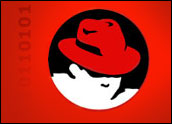
The same group that said that free and open-source software was a bigger security risk than commercial software and also claimed that Linus Torvalds ripped off the Linux kernel plans to release a new report in a few weeks.
Ken Brown, director of the Alexis de Tocqueville Institution’s technology program authored the study, tentatively titled “Intellectual Property Left.” He told LinuxInsider that the report will argue that “the IT industry sector’s reluctance to pursue rampant IP infringement against public domain software developers and users isgoing to precipitate billions of dollars in balance sheet downgrades by Wall Street.”
Warning Investors
“This is going to be precipitated by a number [of] events, each connected in different ways to repeated decisions by prominent companies not to prosecute infringers,” said Brown.
Referring to telecommunications, video game, and even security software companies, Brown argues: “In different degrees a number of these companies are choosing not to challenge rampant IP infringement of their products in the public domain, for a number of reasons, most notably to address public relations concerns.”
The result, Brown maintains, is that “if infringement cases go unchallenged, there is a strong possibility that each related IP asset tied to the infringement will be erased, particularly because it will become quite apparent in court (and subsequently to investors) that they knew about the infringement and by deciding to do nothing about it, assisted in perpetuating it.”
Position Not New
This is not the first time that senior managers at ADTI have put forward the open-software devaluation theory. In a UPI column dated October 3, 2003, the group’s director and UPI columnist Gregory Fossedal argued that “smart investors are putting their shorts on the computer software industry, with a special emphasis on the pitiful, helpless giants such as Sun Microsystems, Oracle, and even Microsoft.
“Awash with cash and wishy-washy bureaucracy that would have scandalized their founders 25 years ago, these are the giants that have the furthest to fall — and will have the most difficult time dealing not only with emerging market piracy, but the more subtle assault of ‘open-source’ software termites operating in the U.S. and Western Europe.
“Sun and Oracle have even tried to sidle up to the Linux and open-source movement. In effect, they have invited the termites into their house, hoping that after a little munching a symbiotic relationship can be worked out. ‘Let them eat Microsoft,’ is the motto, and, to be sure, there is a special hatred reserved only for Bill Gates among the community of programmers who couldn’t get hired, or compete, with the Redmond wunderkind over several generations of products,” wrote Fossedal.
Losing Face
The ADTI report comes about six months after the organization released a manuscript claiming that Linus Torvalds wrongfully appropriated key parts of MINIX in the first version of Linux, and that this alleged legacy has forever tainted open-source software, creating a climate of piracy.
Many of those quoted in the report — including Andrew Tanenbaum, professor ofcomputer science at Vrije University in Amsterdam and the author of MINIX, and Richard Stallman, the founder of the Free Software Foundation, have vehemently challenged both the report’s conclusions and the way their personal comments were construed in the report.
At the time, Tanenbaum went so far as to dedicate a part of his Web site to the topic. The Linux community, dubbing ADTI “the think tank that didn’t,” generally thought that they’d discredited the group for good.
For example, Eben Moglen, a professor of law at Columbia University who has done extensive pro bono work for the Free Software Foundation, recently dismissed ADTI as having lost all credibility in the public policy arena, and as of last summer, he said, it “has … value to software monopolists only to the extent that they can spread fear, uncertainty, and doubt.”
Nine Lives?But history suggests that ADTI has a long history of moving on to new pastures, sometimes after seeing its positions adopted as public policy — as in the case of immigration and school “reform.” Sometimes the group moves on after taking positions that are widely ridiculed, as was the case with its position that claimed the large body of evidence linking second-hand smoke and health problems was flawed.
Often, ADTI issues reports favorable to its corporate givers. Though the organization won’t talk publicly about its funding, Philip Morris’s own corporate phone book, available publicly as part of the settlement of a large lawsuit, indicates that the organization was “funded by Philip Morris.” (See report.)
Conservative Causes
During that time, a senior fellow at ADTI, S. Fred Singer, was listed as the main author of an influential report that was submitted to legislators and at several trials as justification for not taking strong action on the issue of second-hand smoke.
The report was widelyattacked as “junk science” and ridiculed by many anti-tobacco activists as the epitome of “astroturfing,” a term that means to pretend that a viewpoint comes from an unbiased, grass-roots group, when it has in fact been funded as part of a concerted media plan in an attempt to put the funders’ words into more reputable-sounding mouths.
Much of the money that ADTI has received has come from sources generally considered to be conservative, such as the Scaife Foundation, and indeed, worldwide many of the organizations that most oppose free or open software are conservative.
For example, the Christian Social Union was the only block to oppose the use of Linux in Germany’s government functions because a free software movement there might destroy commercial software interests around Munich, where Microsoft’s Germany operations are located.
Changing Scene
Such a link is understandable, Columbia’s Moglen told LinuxInsider. “[Microsoft] stands for monopoly software, which is the status quo. We stand for free software, which can be used by anybody who knows how. So conservatives have an interest in defending the status quo and the interests that already exist and are profiting from it.”
More recently, press reports said confidential sources confirmed that ADTI has taken money from Microsoft, but nobody been able to prove it publicly.
Interestingly, Moglen contends that the days of commercial software vendors, which rely heavily on patents to maintain revenues and exclusive features, are probably numbered, though he clearly disagrees on the desirability of the eventual outcome.
Moglen recently told LinuxInsider that “People are waking up to the fact that free and open software is available, and that it works as well and usually better than what the monopolists provide, and when the world realizes that … they will refuse to pay monopoly prices, and their [the monopolists’] perceived value will decline rapidly.”






















































"about six months after the organization released a manuscript claiming that Linus Torvalds wrongfully appropriated key parts of MINIX in the first version of Linux, and that this alleged legacy has forever tainted open-source software, creating a climate of piracy."
And they are releasing their new report about 5 months and 29.5 days after their claims were thoroughly discredited by several persons, including the author of Minix.
Yes.. Lets warn all those investors that are literally throwing money at companies who are investing in open source products.. Oh wait, you mean those are not the ones they are worried about? lol You know, in the online world we call people and groups that act as proxies for other companies and lie about things "trolls". Someone needs to take these real world trolls down a few notches.
These discredited corporate sock-puppets seem to have a near perfect record of getting nothing right. Why are you wasting time covering them? A four year old kid with a towl wrapped around his head peering into a snow globe and pretending to be a fortune teller would be a better source of information than these clowns.